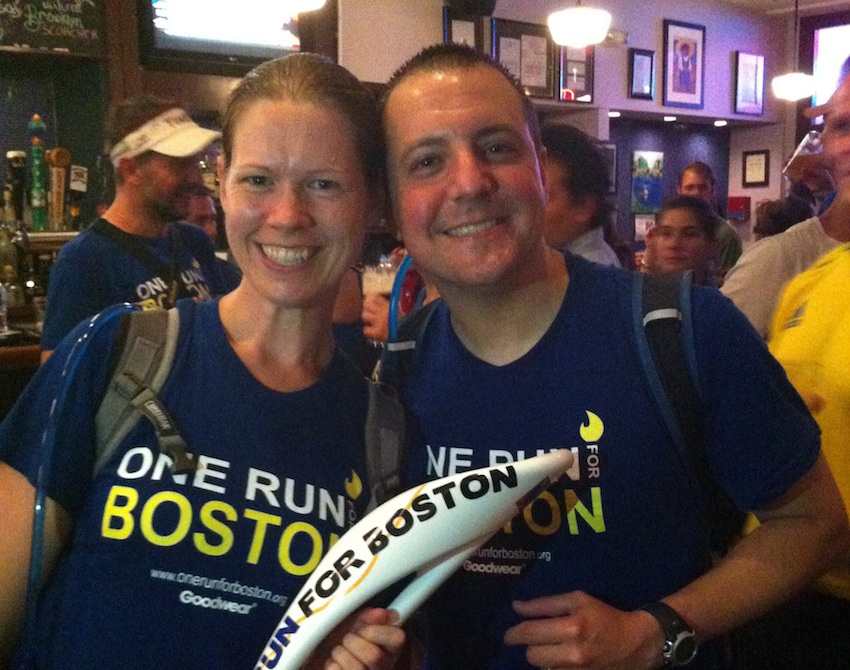Boston Researcher Hopes to Develop Long Term Vaccine for Cholera

Meagan Bufano and her husband, Mike, after crossing the finish line during the One Run for Boston. Photo provided.
Meagan Bufano, 36, wasn’t born in Boston. But like many of us, she feels like she’s found her home in this city. After spending three years researching infectious diseases at Massachusetts General Hospital, surviving and coping with the Boston Marathon bombings, and running in the final leg of the One Run for Boston last week, Bufano can’t think of any place she’d rather live.
We sat down with the amateur chef, researcher, and marathon runner to talk about her newest cholera research.
What’s new in your research at Mass General, and why do you like your job?
I am currently working on vaccine development for cholera in the Infectious Disease department. My team is working with an animal model now, but the hope is that we can make an injectable vaccine for humans very soon. All of the current cholera vaccines are orally administered and they only provide short durations of protection, so in addition, we are trying to increase the length of protection.
I love science, and I always have, so I think I gravitated toward research because of the unknown. Every day I learn something new and it brings me that much closer to an answer. I think research brings out the investigative and competitive nature in me and puts it towards a worthy cause.
What’s special about living and working in Boston?
I currently live in the South End, but I’m from New Jersey originally. I’ve lived in Boston since 2002, apart from a brief move to New York, and although I grew up somewhere else, I feel like Boston is my home.
I was at the finish line of Boston Marathon on April 15th during the bombings, and was about 50 feet away from each explosion, right between them. I have been back to the spot and it’s weird. The day of, I didn’t really think about how close I was to the explosions. When I went back, I thought “that’s where I was,” and it hit me. For a long time, I’ll pass that spot and I’ll feel lucky. For lots of reasons, the experience of being here during the bombings and processing them afterward has made Boston feel even more like home for me.
How were you able to process your experience of being at the bombings?
I decided to do the One Run for Boston because I wanted to go back and get some closure, and I thought it was for a great cause. I ran the last leg of the race, so I started in Newton around 11:30 p.m. It was late, but I felt like it was a better experience because it was late— it felt more social. I ran with a lot of friends and with my husband, who is not a runner. We all finished it together, which was special.
I wanted to run the race to get closure because I understand the running aspect of this whole event. I’m a runner, and I know that when you run marathons, you put so much time and energy into training. When you get that finish taken away from you… I can’t imagine what that would be like. I’ve always gotten to finish what I started. You usually put 16 to 18 weeks of running and killing your body into marathon training, so the ultimate reward is crossing that finish line. Being with many of the Boston Marathon runners as they finally completed the race during the One Run was emotional. There are no words to describe it.
What was it like to cross the finish line yourself?
So this race started in L.A. and went across the entire country with a GPS baton device that was passed along to people the whole way. A group of runners crested a hill from Wellesley when we were waiting for our leg of the race, and we could see them in headlamps and glow-in-the-dark t-shirts. We erupted into cheers, and then we took off running. Obviously there were less people at the finish line than at the actual marathon. It was late, it was a Sunday, and it was raining. The run was about seven miles, so we finished at 12:30 a.m., but people came out of the bars to cheer us on. Bus drivers stopped their busses in the street to block traffic. It brought everyone together like it did on that day.
July 1st, the day I crossed the finish line, was also my birthday. I turned 36 while I was running, so that was meaningful, too.
What do you do when you’re not running or researching?
I enjoy working out, especially bootcamp and yoga classes. I love reading and am a member of a monthly book club with some local friends. But my real passion is cooking, baking, and entertaining. I love trying new recipes and making my husband and friends my taste testers. No one ever comes to a party at our house and leaves hungry! I’ve always said that if I wasn’t a scientist, I would own my own bake shop.


